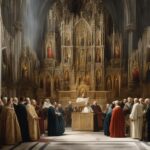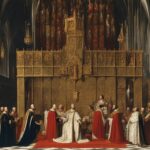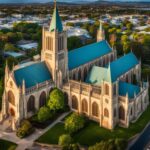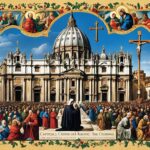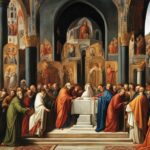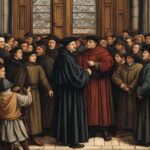The Anglican Church, with its rich history and profound influence, has shaped the spiritual journey of millions around the world. Rooted in the 16th-century Reformation in England, the Anglican Communion emerged as an independent church when King Henry VIII broke away from the authority of the Roman Catholic pope and established the Church of England. This momentous event marked the beginning of a remarkable journey for the Anglican Church.
The essential teachings of the church were defined in The Book of Common Prayer, which became the foundation of Anglican worship and belief. Through colonization, the Church of England spread its influence to different parts of the world, establishing autonomous churches that formed the global Anglican Communion.
The Anglican Church holds the Lambeth Conference, a gathering held every 10 years, which serves as a cohesive factor in Anglicanism. This conference brings together Anglican bishops from around the world to discuss matters of faith, practice, and unity.
Key Takeaways:
- The Anglican Church traces its origins to the 16th-century Reformation in England when King Henry VIII established the Church of England as an independent church.
- The essential teachings of the church were defined in The Book of Common Prayer.
- The Anglican Church expanded globally through colonization and established autonomous churches in different parts of the world.
- The Lambeth Conference, held every 10 years, serves as a cohesive factor in Anglicanism.
- The Anglican Church’s history is intertwined with significant events and figures that have shaped its faith and practice.
Stay tuned to explore more about the Anglican Church’s beliefs, sacraments, leadership, worship practices, community engagement, architectural features, and contemporary challenges. Join us on this enlightening journey as we delve into the depths of the Anglican Church’s rich heritage and vibrant spirituality.
Origins of the Anglican Church
The Anglican Communion traces its roots back to the 16th century, when King Henry VIII of England broke away from the authority of the Roman Catholic pope and established the Church of England. This pivotal moment in history, known as the Reformation, marked the beginning of the Anglican Church as an independent entity.
Under Henry VIII’s reign, the Church of England developed its own distinct theology and practices, blending elements of Catholic tradition with Protestant principles. The Reformation provided an opportunity for the English monarch to consolidate power and assert authority over religious matters within the realm.
The Church of England quickly gained influence and prominence, spreading its teachings and doctrines across Britain and its colonies. British explorers, traders, and colonists played a significant role in taking the Anglican Church to different parts of the world, contributing to the growth of the Anglican Communion.

The organization of the Church of England took shape during the 16th and 17th centuries, as various religious and political factors influenced its structure. The essential teachings and liturgical practices of the Anglican Church were outlined in The Book of Common Prayer, which became a cornerstone of Anglican worship and spirituality.
Today, the Anglican Communion encompasses a global network of churches, each with its own autonomy and regional characteristics. While rooted in the history and traditions of the Church of England, the Anglican Church continues to evolve and adapt to the changing cultural and social landscape.
Key Points:
- The Anglican Church originated from the Reformation led by King Henry VIII of England.
- It established the Church of England, which developed its unique theology and practices.
- Anglican teachings and influence spread through British colonization and exploration.
- The organization of the Church of England was solidified in the 16th and 17th centuries.
Beliefs and Doctrines of the Anglican Church
The Anglican Communion is known for its unique blend of Catholic and Protestant traditions, positioning itself as a middle ground between the two. Anglicans hold a Trinitarian understanding of God, recognizing the Holy Trinity of Father, Son, and Holy Spirit. Central to their beliefs is the acceptance of Jesus Christ as the Son of God and the Savior of humanity.
The Anglican Church regards the Bible as the holy book, which includes both the Old Testament and the New Testament. It serves as the authoritative guide for Anglican beliefs and practices.
Anglicans also affirm their faith through the recitation of creeds. The Nicene Creed and the Apostles’ Creed are considered significant statements of their beliefs, outlining essential Christian doctrines.
The Anglican Communion practices two sacraments: baptism and the Eucharist. Baptism is regarded as a rite of initiation into the Christian faith, symbolizing spiritual rebirth and entry into the Church. The Eucharist, also known as Holy Communion, is a central act of worship, where Anglicans believe in the real presence of Christ in the bread and wine.
Anglicans embrace the sacraments as sacred rituals that connect them with the divine and nurture their faith.
Alongside the sacraments, Anglicans recognize other important religious rites, such as confirmation, ordination, marriage, the reconciliation of the penitent, and the anointing of the sick. These rites play significant roles in the spiritual journey of Anglicans, strengthening their commitment to their faith and fostering a sense of community.
Sacraments and Rituals in the Anglican Church
The Anglican Communion upholds the significance of sacraments and rituals as integral components of its worship and religious practices. These sacraments and rituals serve as powerful symbols of faith and provide Anglicans with pathways to connect with God and experience spiritual growth.
Baptism and the Eucharist
The Anglican Church recognizes two sacraments – baptism and the Eucharist. Baptism, a rite of initiation, symbolizes the cleansing of sins and the incorporation into the body of Christ. Through the sacrament of baptism, individuals become members of the Anglican community and are sanctified by the Holy Spirit.
The Eucharist, also known as Holy Communion or the Lord’s Supper, holds deep significance in Anglican worship. Anglicans believe in the real presence of Christ in the elements of bread and wine, which are consecrated and shared among the faithful during the Eucharistic ritual. This sacrament commemorates the Last Supper and reinforces the spiritual bond between believers and their Savior.
Other Religious Rites
In addition to the sacraments, the Anglican Church acknowledges and celebrates various other important religious rites. Confirmation, a sacramental rite, allows individuals to publicly affirm their faith and receive the blessing of the Holy Spirit. Ordination is a solemn ceremony in which clergy members are commissioned to serve the church and carry out their pastoral duties.
Marriage, commonly known as the sacrament of matrimony, is a sacred ceremony that unites two individuals in the presence of God and their community. Reconciliation of the penitent, also known as confession, offers a way for individuals to seek forgiveness and reconcile with God. Lastly, the unction of the sick, or anointing of the sick, provides spiritual comfort and healing to those who are ill or nearing the end of their lives.
Anglican Worship Services
Anglican worship services, although they may vary in specific details, generally involve a combination of sacraments, rituals, prayers, Psalms and hymns, readings from the Gospels and the Bible, and a sermon. These elements come together to inspire and nourish the faith of Anglicans, fostering a deep connection with God.
Easter and Christmas, the most significant Christian holidays, hold special prominence in the Anglican Church. Easter commemorates the resurrection of Jesus Christ and represents a period of spiritual renewal and hope. Christmas celebrates the birth of Christ, reminding Anglicans of God’s love and the gift of salvation.
Regular attendance at weekly services is encouraged in the Anglican Church, as it provides opportunities for communal worship, fellowship, and spiritual growth.
Through its sacraments and rituals, the Anglican Church offers believers profound encounters with God’s grace and teachings, guiding them towards spiritual transformation and a deeper understanding of their faith.
Leadership and Clergy in the Anglican Church
The Anglican Communion follows a threefold order of ministry, consisting of bishops, priests or presbyters, and deacons. Each plays a key role in the leadership and spiritual guidance of the church.
Bishops: The bishops hold the highest position within the Anglican Church’s hierarchical structure. They are responsible for overseeing dioceses, ensuring the spiritual well-being of their clergy and congregations, and upholding the teachings and traditions of the church. The archbishop of Canterbury, as the senior bishop, holds a position of particular importance and influence.
Priests or Presbyters: Priests, often referred to as presbyters, are ordained ministers who serve as spiritual leaders within local parishes. They have the authority to administer sacraments, deliver sermons, and provide pastoral care to their congregations. Priests also play a crucial role in maintaining the continuity of Anglican worship and upholding the teachings of the church.
Deacons: Deacons are ordained ministers who support the work of priests and assist in the administration of sacraments. They serve as a bridge between the church and the community, often engaging in outreach and social justice initiatives. Deacons play an integral role in the Anglican Church’s commitment to service and community involvement.
Within this threefold order of ministry, the Anglican Church maintains a structured and organized leadership system that ensures effective governance and guidance for its clergy and congregations.
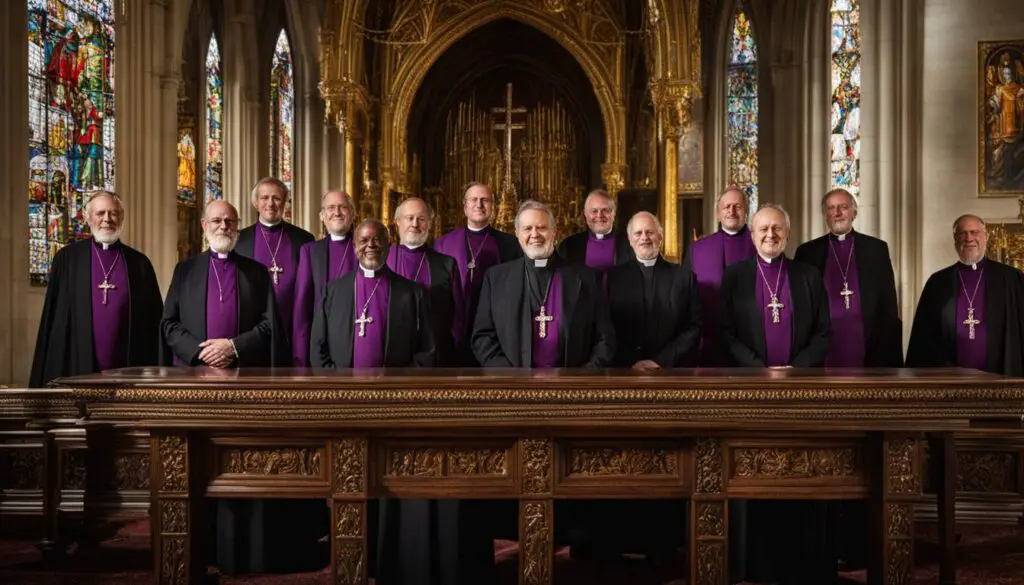
The Role of Anglican Clergy
Anglican clergy members fulfill critical roles within the church, serving as spiritual leaders and guides for their congregations. Their responsibilities include:
- Leading worship services and delivering sermons to provide spiritual nourishment and guidance.
- Administering sacraments, such as baptism and the Eucharist, to facilitate the spiritual growth and renewal of parishioners.
- Providing pastoral care and counseling to support individuals and families during times of joy and struggle.
- Teaching and educating parishioners about the tenets of Anglican beliefs and traditions.
- Maintaining and nurturing the sense of community within their parishes through various outreach initiatives and programs.
- Participating in ongoing professional development and theological study to enhance their knowledge and understanding of Anglican practices.
“The Anglican clergy serve as shepherds, guiding their flocks on their spiritual journey and providing them with the spiritual nourishment and support they need.” – Archbishop Justin Welby
Comparison of Anglican Clergy Roles
| Bishop | Priest or Presbyter | Deacon |
|---|---|---|
| Oversees dioceses and ensures adherence to Anglican teachings | Serves as a spiritual leader in local parishes | Assists priests and engages in community outreach |
| Administers sacraments and ordains priests and deacons | Administers sacraments and provides pastoral care | Assists with sacraments and engages in outreach initiatives |
| Responsible for ordination and discipline of clergy | Delivers sermons and teaches Anglican beliefs | Acts as a bridge between the church and the community |
The leadership and clergy of the Anglican Church play integral roles in guiding the faithful, administering sacraments, and strengthening the sense of community within each parish. Their dedication and commitment to their congregations help foster spiritual growth and influence positive change within and beyond the church walls.
Worship Practices in the Anglican Church
Anglican worship is a diverse and vibrant expression of spirituality, encompassing a range of practices that reflect the rich traditions and beliefs of the Anglican Church. While worship practices may vary among different Anglican communities, there are certain elements that are commonly found in Anglican services.
One significant aspect of Anglican worship is the singing of hymns and Psalms. Music holds an essential role in Anglican services, allowing congregants to participate actively and engage with the worship experience. Hymns and Psalms are sung both individually and collectively, creating a sense of unity and harmony among the worshipers.
Prayer is another crucial component of Anglican worship. Anglicans believe in the power of prayer to connect with God and seek guidance, comfort, and strength. Prayers in Anglican services may take various forms, including intercessory prayers, thanksgiving prayers, and prayers of confession and repentance.
Readings from the Bible hold a central place in Anglican worship. These readings include passages from the Old Testament and the New Testament, offering guidance and inspiration to the congregation. The Bible is seen as the authoritative word of God, and its teachings form the basis for Anglican beliefs and practices.
The Bible is the living word of God, a guide for our lives and a source of spiritual nourishment. Through the reading of Scripture, we are reminded of God’s faithfulness and love.
A sermon delivered by the presiding minister is also an integral part of Anglican worship. The sermon offers a message of hope, encouragement, and spiritual insight, helping the congregation to reflect on the teachings of the Bible and apply them to their daily lives. The sermon serves as a guide for personal growth and transformation.
The Eucharist, also known as Holy Communion or the Lord’s Supper, is a central sacrament in Anglican worship. It commemorates the Last Supper of Jesus Christ and His sacrifice on the cross. During the Eucharist, bread and wine are consecrated and shared among the worshipers, symbolizing the body and blood of Christ. Anglicans believe that partaking in the Eucharist brings them closer to God and strengthens their faith.
Anglicans also place great importance on liturgical traditions and the use of the Book of Common Prayer. The Book of Common Prayer, first published in 1549, contains the order of worship, prayers, and liturgical texts used in Anglican services. It provides a framework for worship that reflects the collective identity and shared beliefs of the Anglican Church.
Overall, Anglican worship practices aim to create a sacred and reverent space where individuals can connect with God, draw closer to His presence, and deepen their understanding of the Anglican faith.
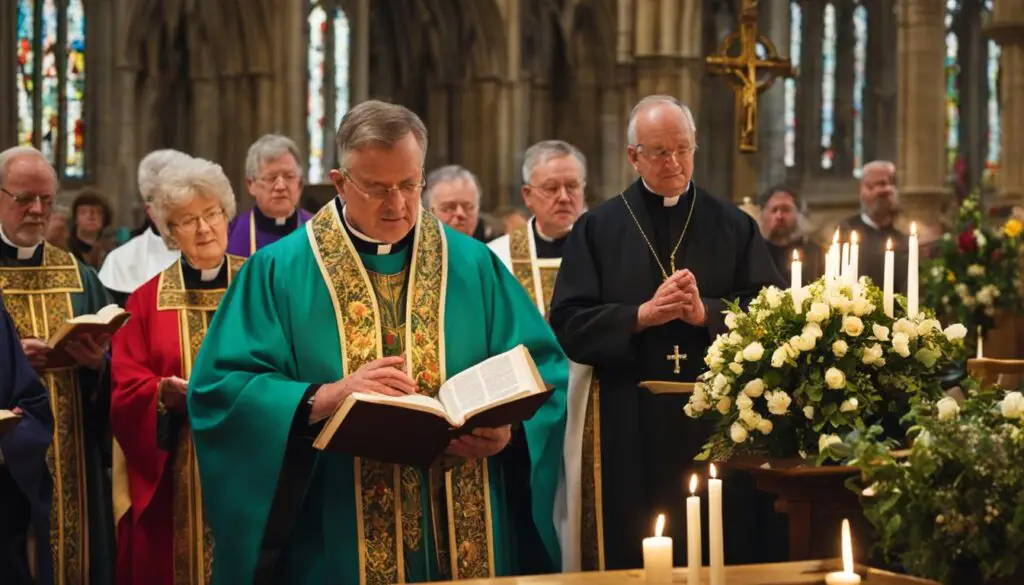
| Elements of Anglican Worship | Description |
|---|---|
| Singing of hymns and Psalms | Participatory music that fosters unity and spiritual connection among worshipers. |
| Prayer | Various forms of prayer, including intercessory prayers, thanksgiving prayers, and prayers of confession and repentance. |
| Readings from the Bible | Passages from the Old Testament and the New Testament that offer guidance and inspiration. |
| Sermon | A message delivered by the presiding minister, providing spiritual insight and guidance for personal growth. |
| Eucharist | The Sacrament of Holy Communion, commemorating the Last Supper of Jesus Christ. |
| Liturgical traditions | Emphasis on the use of the Book of Common Prayer and adherence to established liturgical practices. |
Sacred Texts in the Anglican Church
The Anglican Church considers the Bible as its central sacred text, which includes the Old Testament, or Hebrew Bible, and the New Testament. Anglicans hold a deep reverence for the Scriptures and recognize them as the authoritative source of their beliefs and practices.
Anglicans place great importance on the study and interpretation of the Bible, seeking to understand its teachings and apply them to their lives. The Bible serves as a guide for moral and ethical decision-making, providing wisdom and spiritual nourishment to Anglicans around the world.
In addition to the Bible, the Anglican Communion also draws inspiration from the writings of the Church Fathers and other theological works. These writings offer valuable insights and perspectives that further enrich the Anglican faith and contribute to its theological diversity.
“The Bible is the lamp to our feet and the light to our path. It reveals the truth of God’s love and provides us with guidance in our journey of faith.” – Archbishop Desmond Tutu
Through the study and contemplation of sacred texts, Anglicans deepen their relationship with God and gain a deeper understanding of their faith. The Anglican Church values the wisdom and teachings found within these texts and encourages its members to engage with them both individually and in communal worship.
As Anglicans continue to explore and interpret the sacred texts, they seek to discern God’s will for their lives and embrace the transformative power of the Word within their hearts and communities.
Key Points:
- The Bible is the central sacred text of the Anglican Church, comprising the Old Testament and the New Testament.
- Anglicans emphasize the study and interpretation of Scripture to understand and apply its teachings.
- The Anglican Communion draws inspiration from the writings of the Church Fathers and other theological works.
- Anglicans believe that the Bible serves as a lamp to guide their path and reveals the truth of God’s love.
- The Anglican Church values the transformative power of sacred texts and encourages their exploration both individually and in communal worship.

| Sacred Texts | Importance in Anglicanism |
|---|---|
| The Bible (Old Testament and New Testament) | The central sacred text of the Anglican Church, serving as the authoritative source of beliefs and practices. Emphasizes the study, interpretation, and application of Scripture. |
| Writings of the Church Fathers | Provides additional insights and perspectives that enrich the Anglican faith. Contributes to the theological diversity within the Anglican Communion. |
| Other theological works | Offers valuable teachings and wisdom that informs Anglican beliefs and practices. |
Denominations and Sects within the Anglican Church
The Anglican Communion is a richly diverse religious body, comprised of numerous national and autonomous churches that adhere to the teachings of Anglicanism. While all these churches remain united in their loyalty to the archbishop of Canterbury, there are also denominations and sects within the Anglican Church that may embrace different theological emphases or practices.
These various denominations and sects contribute to the vibrant tapestry of Anglicanism, each bringing unique perspectives and traditions to the faith. Here are some examples of denominations and sects within the Anglican Church:
- Anglo-Catholic Tradition: Rooted in the Catholic heritage of the Church of England, the Anglo-Catholic tradition places emphasis on liturgical worship, sacraments, and the apostolic succession of bishops.
- Evangelical Tradition: Known for its focus on personal conversion, biblical authority, and evangelistic outreach, the Evangelical tradition within the Anglican Church emphasizes the importance of preaching the Gospel and sharing faith.
- Broad Church Tradition: Embracing a more inclusive and liberal approach, the Broad Church tradition values intellectual freedom, social justice, and diversity of beliefs within the Anglican Communion.
- Charismatic Movement: The Anglican Charismatic movement emphasizes the experience of the Holy Spirit and places importance on spiritual gifts, such as healing, prophecy, and speaking in tongues, within the context of Anglican worship.
- Continuing Anglican Movement: The Continuing Anglican movement consists of churches and groups that broke away from their parent Anglican bodies due to disagreements over doctrinal issues or changes within the larger Anglican Communion.
These are just a few examples of the denominations and sects that exist within the Anglican Church. Each tradition brings its own distinct practices, theological perspectives, and expressions of faith, contributing to the diversity and richness of the Anglican Communion.
Anglo-Catholic Tradition
“Liturgical worship and the apostolic succession of bishops are essential elements of the Anglo-Catholic tradition within the Anglican Church. Its emphasis on sacraments and reverence for Mary, the mother of Jesus, are central to its spiritual practice.”
Evangelical Tradition
“The Evangelical tradition within the Anglican Church places a strong emphasis on personal faith, biblical authority, and evangelism. It seeks to spread the message of salvation and transform lives through a personal relationship with Jesus Christ.”
Broad Church Tradition
“The Broad Church tradition embraces inclusivity and intellectual freedom within the Anglican Communion. It values social justice, diversity of beliefs, and emphasizes the importance of individual conscience in matters of faith.”
Charismatic Movement
“The Anglican Charismatic movement emphasizes the importance of the Holy Spirit’s work through spiritual gifts such as healing, prophecy, and speaking in tongues. It seeks to foster a dynamic and experiential expression of faith within the Anglican Church.”
Continuing Anglican Movement
“The Continuing Anglican movement consists of churches and groups that separated from their parent Anglican bodies due to theological disagreements or differences. These churches maintain traditional Anglican practices and doctrines, seeking to preserve what they perceive as the orthodox tradition within Anglicanism.”
Denominations and Sects within the Anglican Church
| Tradition | Description |
|---|---|
| Anglo-Catholic Tradition | Rooted in the Catholic heritage of the Church of England, the Anglo-Catholic tradition emphasizes liturgical worship, sacraments, and the apostolic succession of bishops. |
| Evangelical Tradition | The Evangelical tradition within Anglicanism focuses on personal conversion, biblical authority, and evangelistic outreach. |
| Broad Church Tradition | Embracing a liberal and inclusive approach, the Broad Church tradition values intellectual freedom, social justice, and diversity of beliefs. |
| Charismatic Movement | The Anglican Charismatic movement emphasizes the experience of the Holy Spirit and gifts such as healing, prophecy, and speaking in tongues. |
| Continuing Anglican Movement | The Continuing Anglican movement consists of churches and groups that separated from their parent Anglican bodies due to disagreements over doctrinal issues. |
These denominations and sects contribute to the richness and diversity of the Anglican Communion, each offering unique perspectives and expressions of faith within the broader Anglican Church.

Community and Outreach in the Anglican Church
Community and outreach form the core of the Anglican Church’s mission. With a strong commitment to social justice and inclusivity, Anglicans are actively engaged in various forms of community service and advocacy.
Through charitable works and social justice initiatives, Anglicans strive to make a positive impact on marginalized communities. These initiatives range from providing support and assistance to those in need, to advocating for the rights and well-being of vulnerable populations.
Many Anglican churches have dedicated outreach programs that aim to address specific social issues and meet the needs of their local communities. These programs often provide practical assistance, such as food, shelter, and healthcare services, as well as emotional support and spiritual guidance.
Anglicans actively participate in their local communities, working alongside community organizations, government agencies, and other faith-based groups to promote inclusivity, acceptance, and understanding. They seek to build bridges of compassion and foster greater unity among diverse groups.
For those looking to connect with the Anglican Church and its community outreach activities, finding an Anglican church near them is a great starting point. Through their participation, individuals can contribute to the ongoing efforts of making a positive difference in the lives of others.
If you are interested in joining an Anglican church and getting involved in community and outreach activities, use the search term “Anglican church near me” to find a local congregation in your area.
Inclusivity and Acceptance
“We believe in the inherent worth and dignity of every human being, regardless of their background or circumstances. Our community outreach programs reflect our commitment to promoting inclusivity and acceptance within society.” – Reverend Jane Smith, Anglican Priest
Through community and outreach initiatives, the Anglican Church strives to create a more just and compassionate world, one where all individuals are valued and supported. By actively engaging with their local communities, Anglicans aim to address pressing social issues and make a positive difference in the lives of others.
Architectural and Artistic Features of Anglican Churches
Anglican churches are renowned for their awe-inspiring architectural designs and intricate artistic elements. These sacred spaces often incorporate Gothic or Victorian architectural styles, showcasing exquisite stained glass windows, ornate woodwork, and meticulously crafted carvings that reflect the beauty and grandeur of the Anglican Church.
The use of music and choral performances holds a significant place in Anglican liturgical traditions, enhancing the worship experience. The harmonious melodies and powerful voices reverberating within these hallowed walls uplift the spirits of congregants and create a sense of transcendence.
Within the sacred realms of Anglican churches, a rich artistic heritage is cherished. These spiritual sanctuaries often house an array of masterful paintings, sculptures, and other forms of visual art. These artistic expressions not only add to the aesthetic allure of these places of worship but also convey profound spiritual messages and inspire contemplation.
Contemporary Issues and Challenges in the Anglican Church
The Anglican Communion, like any religious institution, faces its fair share of contemporary issues and challenges. These challenges include ongoing debates surrounding the ordination of women and LGBTQ+ rights within the church, as well as disagreements over theological interpretation and various social issues. These tensions have resulted in divisions among member churches, particularly concerning divergent views on human sexuality and the ordination of LGBTQ+ individuals.
Debates over the Ordination of Women
One of the ongoing debates in the Anglican Church revolves around the ordination of women as priests and bishops. While some member churches fully embrace the ordination of women, others still hold reservations or even oppose it based on differing interpretations of Scripture and traditional teachings. This issue has caused rifts within the Anglican Communion and continues to be a point of contention.
LGBTQ+ Rights and Inclusion
The Anglican Church grapples with differing views on LGBTQ+ rights and inclusion. While some member churches are inclusive and accepting of LGBTQ+ individuals, others maintain conservative positions that regard homosexuality as incompatible with their theological beliefs. This division has led to tensions and conflicts within the Anglican Communion, with different member churches holding opposing positions on same-sex relationships and the ordination of LGBTQ+ clergy.
“In the midst of these challenges, the Anglican Communion is called to navigate complex issues with grace, love, and understanding.”
Theological Interpretation and Social Issues
Alongside the debates on gender and sexuality, theological interpretation and differing stances on social issues also contribute to the challenges faced by the Anglican Church. Member churches may have divergent views on topics such as human rights, environmental concerns, social justice, and other contemporary ethical matters. These differences in theological interpretation and priorities can create frictions and strains within the Anglican Communion.
Striving for Unity and Dialogue
Despite these challenges, many Anglicans across the Communion are committed to fostering unity, understanding, and dialogue. Efforts are being made to find common ground and facilitate respectful conversations on these contentious issues. Anglican leaders and theologians engage in discussions, conferences, and theological commissions to address the challenges and seek ways to move forward together as a global religious community.
| Contemporary Issues | Challenges |
|---|---|
| Debates over the ordination of women | Differences in interpretation of Scripture, traditional teachings |
| LGBTQ+ rights and inclusion | Conflicting views on same-sex relationships, ordination of LGBTQ+ clergy |
| Theological interpretation | Disagreements on social issues, human rights, environmental concerns |
Conclusion
The Anglican Communion, with its rich history, enduring beliefs, and dynamic worship practices, has had a profound impact on spirituality for millions of people around the world. From its origins in the 16th-century Reformation in England to its global expansion through colonization, the Anglican Church has left an indelible mark in the Christian landscape.
Throughout its journey, the Anglican Church has faced various challenges and engaged in debates over theological interpretations, social issues, and matters of inclusion. However, it has shown its ability to evolve and adapt to the changing times while remaining firmly rooted in its traditions.
Today, the Anglican Communion continues to be a significant force in the worldwide Christian community. Emphasizing inclusivity, social justice, and the pursuit of spiritual growth and understanding, Anglicans strive to make a difference in their local communities and beyond.
With its emphasis on sacraments, ritual worship, and the use of sacred texts, the Anglican Church provides a diverse and vibrant spiritual experience to its members. Its architectural and artistic features, along with its commitment to community outreach, further exemplify the depth and richness of the Anglican tradition.
As the Anglican Communion moves forward, it faces contemporary issues and challenges. Debates over the ordination of women and LGBTQ+ rights have caused divisions, but the Anglican Church remains committed to seeking common ground and fostering dialogue among its diverse member churches.
In conclusion, the Anglican Communion stands as a testament to the enduring power of faith, unity, and resilience. With a legacy that spans centuries, it continues to inspire individuals to explore their spirituality, engage in acts of service, and make a positive impact on the world.
FAQ
What is the history of the Anglican Church?
The Anglican Communion traces its origins back to the 16th-century Reformation in England when King Henry VIII broke away from the authority of the Roman Catholic pope and established the Church of England as an independent church.
What are the origins of the Anglican Church?
The roots of the Anglican Communion can be traced back to the 16th century when King Henry VIII rejected the authority of the Roman Catholic pope and established the Church of England.
What are the beliefs and doctrines of the Anglican Church?
Anglicans adhere to a Trinitarian understanding of God, believe in Jesus as the Son of God, accept the Nicene Creed and the Apostles’ Creed as statements of their beliefs, and consider the Bible as their holy book.
What sacraments and rituals are practiced in the Anglican Church?
The Anglican Church practices two sacraments – baptism and the Eucharist – and recognizes other important religious rites such as confirmation, ordination, marriage, reconciliation of the penitent, and unction of the sick.
What is the leadership structure in the Anglican Church?
The Anglican Communion follows a threefold order of ministry, consisting of bishops, priests or presbyters, and deacons. The archbishop of Canterbury holds the highest rank.
What are the worship practices in the Anglican Church?
Anglican worship services often include the eucharistic rites, prayer, Psalms and hymns, readings from the Gospels and the Bible, and a sermon.
What are the sacred texts in the Anglican Church?
The Bible, consisting of the Old Testament and New Testament, is the central sacred text of the Anglican Church.
What denominations and sects exist within the Anglican Church?
There are various denominations and sects within the Anglican Church, including the Anglo-Catholic, Evangelical, and Broad Church traditions.
How does the Anglican Church engage in community and outreach?
Anglicans engage in various forms of community service, social justice initiatives, and outreach programs that provide support and assistance to those in need.
What are the architectural and artistic features of Anglican churches?
Traditional Anglican churches often display elements of Gothic or Victorian architecture, stained glass windows, ornate woodwork, and rich artistic heritage.
What are the contemporary issues and challenges faced by the Anglican Church?
The Anglican Church faces challenges related to the ordination of women, LGBTQ+ rights, theological interpretation, and social issues.
What is the significance of the Anglican Church?
The Anglican Church has a rich history, enduring beliefs, and dynamic worship practices. It continues to evolve and adapt to the changing times while staying rooted in its traditions, emphasizing inclusivity, social justice, and spiritual growth.





